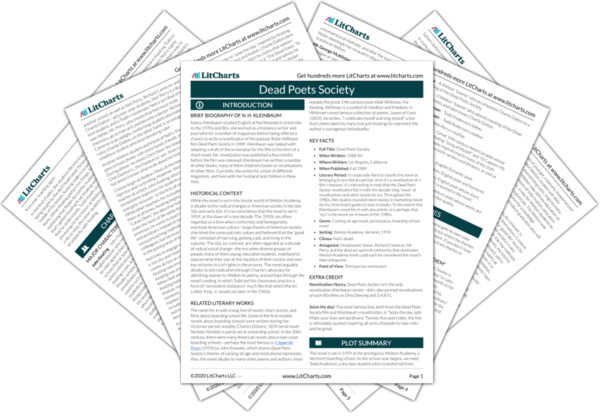Minor Characters
Mr. Portius
The elderly English teacher who retires from Welton Academy, setting in motion the plot of the novel.
Alexander Carmichael
The oldest living alumnus of Welton Academy, who makes an unintelligible speech for the beginning of the school year.
Chet Danburry
The spoiled, arrogant son of the wealthy Danburry family, and, for most of the novel, Chris Noel’s boyfriend.
Virginia Danburry
Chet Danburry’s 15-year-old sister, who later takes a part opposite Neil Perry in a production of A Midsummer Night’s Dream and begins to date Charlie Dalton.
Chris Noel
A beautiful young woman who is dating Chet Danburry at the beginning of the novel, but who eventually leaves Chet for Knox Overstreet.
Dr. Hager
Welton Academy’s strict, severe math teacher.
Steven Meeks
A friendly, intelligent Welton student who joins the Dead Poets Society after being inspired by John Keating’s lessons.
Pitts
A Welton student who joins the Dead Poets Society after being inspired by John Keating’s lessons.
Mrs. Nolan
The wife and secretary of Headmaster Gale Nolan.
Jeffrey Anderson
The older brother of Todd Anderson.
Mr. Danburry
Chet Danburry’s father, and a friend of Knox Overstreet’s father.
Mrs. Danburry
Chet Danburry’s mother.
Tina
A Welton “townie” who accompanies Charlie Dalton to a meeting of the Dead Poets Society.
Gloria
A Welton “townie” who attends meeting of the Dead Poets Society and later kisses Charlie Dalton.
Mr. Anderson
Todd Anderson’s father.
Mrs. Anderson
Todd Anderson’s mother.
Mrs. Perry
Neil Perry’s mother.
Walt Whitman
Great 19th century American poet whose radical works, including “Song of Myself” and “O Captain! My Captain!” were deeply inspirational to many of the 20th century’s most iconoclastic writers and thinkers, as well as John Keating.
William Wordsworth
English Romantic poet.
John Dryden
17th century English poet and humorist.
W. E. Henley
19th century English poet whose short inspirational poem, “Invictus” is quoted in the novel.
Vachel Lindsay
Early 20th century poet whose works are often celebrated for their chant-like quality.
